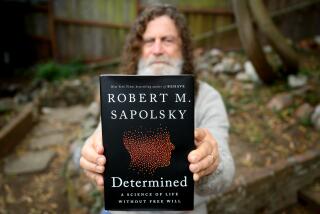What happened to self-restraint?
- Share via
Re “Want a man, or a worm?” Opinion, March 12
David Barash’s defense of heterosexual male promiscuity as an evolutionary imperative is one of the less persuasive applications of sociobiology I’ve seen lately. Yes, the differential contribution of men and women to reproduction means that different sexual strategies are more or less likely to favor the transmittal of the male’s or female’s genes to succeeding generations. But this process does not occur in a cultural or environmental vacuum. Patterns of trust, adherence to group norms, adaptation to specific ecological niches -- these and other factors are just as important in determining fitness and survival as a single behavior, such as promiscuity or monogamy, examined in isolation. Evolution has much to teach about the development of human cultures. But it needs to be handled as a scalpel, not a bludgeon.
Thomas Habinek
Professor of Classics
USC, Los Angeles
--
Reading the subhead of this article, “just doing what comes naturally,” I worried that Barash was condoning sexual infidelity or sexual promiscuity. Then toward the end of the column he stated: “people ... act contrary to their biologically given inclination. ... [This] is what makes us human.” So true. Indeed, if we succumbed to our biological inclination or urge each time it struck, we wouldn’t need bathrooms anymore. We would do what comes naturally at any time, anywhere, just as other animal species do.
No, we don’t want worms. We want people who can behave themselves above worms’ standard.
Teresa Chenfu Yu
Rancho Palos Verdes
--
Barash uses various terms to describe the condition of being a powerful, successful male Homo sapiens. Sadly, the term “courage” does not appear. In fact, it appears rarely nowadays in public discourse. But an argument could be made that Spitzer displayed a lack of it. I miss courage.
Marshall Bell
Los Angeles






